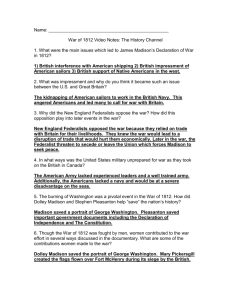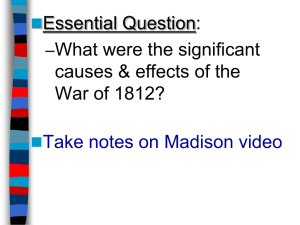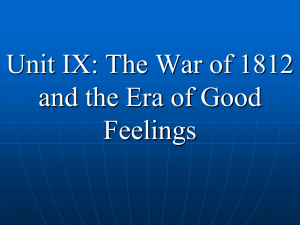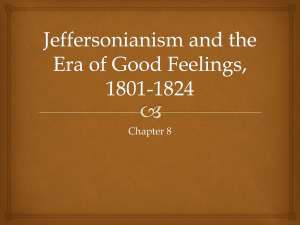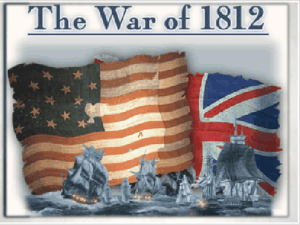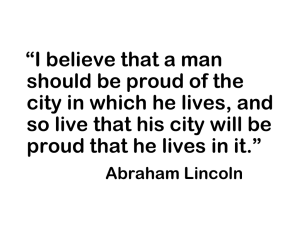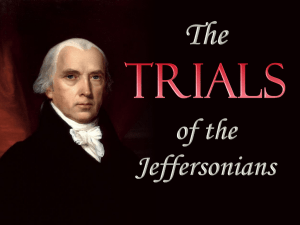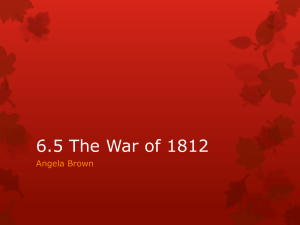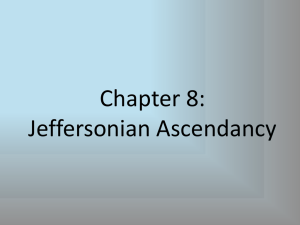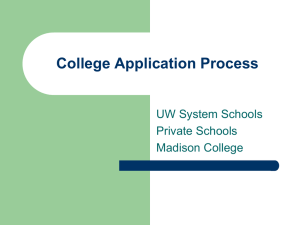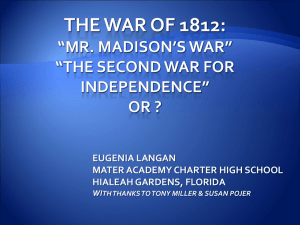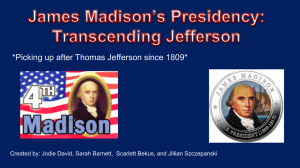CHAPTER 8 The Young Nation Goes to War +
advertisement
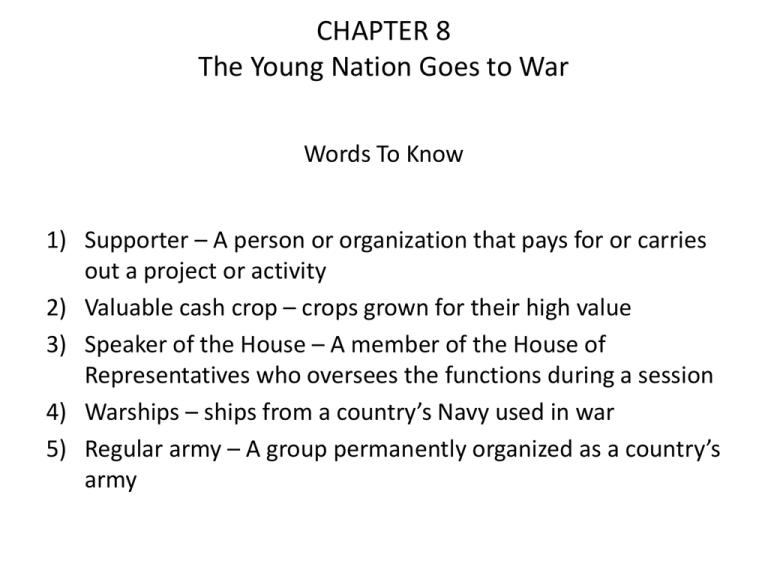
CHAPTER 8 The Young Nation Goes to War Words To Know 1) Supporter – A person or organization that pays for or carries out a project or activity 2) Valuable cash crop – crops grown for their high value 3) Speaker of the House – A member of the House of Representatives who oversees the functions during a session 4) Warships – ships from a country’s Navy used in war 5) Regular army – A group permanently organized as a country’s army 6. Navy – A nation’s group of ships used for war 7. Declaration of war – declaring or announcing war on another country 8. Capitol – the building where the United States Congress meets 9. Afire – to be on fire 10. Pact – a treaty made between two countries 11. Anthem – a song of praise 12. Worldwide – involving the entire world 13. Treaty of Ghent – The treaty signed by American and British representatives in 1814 PRESIDENT JAMES MADISON • • • • Was the fourth President of the US Faced the challenge of finding a new policy for peace Proposed a new policy that permitted foreign trade Wanted to restore trade that was lost under the Embargo Act • The policy said that if either France or England would lift its restrictions against America, it would refuse to trade against the other country • Madison hoped both countries would agree Madison’s Plan Fails • Napoleon of France took advantage of Madison’s proposal • He planned on using the US against his British enemy • In August of 1810 the emperor stated in unclear terms that France would accept American trade • They would not seize American ships War Talks Begin • Important changes took place in 1811 • Congress was made up of young, aggressive men from the South and West • They were call “the boys” • • • • • They did not like the was the US was being treated by Britain They became known as the “War Hawks” Henry Clay from Kentucky was a brilliant speaker Chose to lead the House of Representatives 34 years old • Clay and his followers were tired of Indian raids on the frontier they blamed on the British • They wanted to ensure freedom of the seas • War would result if not given that right • • • • British continued to seize American ships and sailors Almost 1000 ships taken by British More than 500 were taken by the French Both England and France were enemies of the US • The British were long time enemies of America • France on the other hand helped the US during the Revolutionary War • Jefferson spent years in France • Madison was also a French supporter • Madison unfortunately trusted Napoleon • Napoleon only wanted to use the US The War Draws Closer • The country’s population had increased from 4 million to 6 million • They felt the time had come to take action • War Hawks led the way • England decided to agree to Madison’s earlier offer to reopen trade • Unfortunately Madison was unaware of this. Attitudes Toward the War • Both Henry Clay and John C. Calhoun saw British-owned Canada as an easy target • Thought Canada could be defeated in a few weeks • War Hawks continued to stir up public opinion so Madison would have 2g2 war with England • Northern states opposed war with England • Several reasons for war a. seized American ships and sailors b. interfered with trade c. closed their ports to American goods d. stirred up Indians against American The United States Was Poorly Prepared • The regular Army of the United States was poorly trained and very small • Only six to seven thousand men • No money to pay for well trained army. • America’s Navy was also poorly prepared • It only had a few warships Madison’s Re-election in 1812 • Election of 1812 was a contest between a. War Hawks (supported Madison) b. Those for peace (supported Dewitt Clinton) • The vote was close The War of 1812 • President Madison asked Congress for a declaration of war against England • Both House of Representatives and Senate approved • Madison declared war on June 19, 1812 • He was unaware the British decided to reopen trade with US The United States Has Some Success • Capt. Oliver Hazard Perry defeated a British naval fleet on Lake Erie in 1813 • Stopped British invasion of the Ohio Valley • General William H. Harrison defeated a British and Indian force in the Battle of the Thames River • Killing Indian chief Tecumseh • That put an end to reorganizing Indians against settlers • Harrison later became the 9th president • Andrew Jackson defeated the Creek Indians at Horseshoe Bend in early 1814 • Jackson’s victory forced Indians to sign a treaty that opened up the southwest for American settlers The British Burn the Capitol • In August 1814 the British fleet landed 4 thousand soldiers close to Washington DC • In a few hours the Capitol building and the White House were afire • This was a crushing blow to Americans British Attack Baltimore • The British navy shelled Fort McHenry trying to capture Baltimore • Francis Scott Key (a Georgetown lawyer) watched battle take place • He wrote poem “Star Spangled Banner”… later became national anthem The Battle of New Orleans • The battle was fought after the Americans and British had signed treaty ending the war of 1812 • The Battle of New Orleans took place because news of the pact had not reached New Orleans • Andrew Jackson was ordered to command troops in New Orleans • Jackson had been fighting Indians since the age of 14 • He often defeated Indians in battle • He was a greatly respected leader • At New Orleans his soldier faced 8 thousand of England’s best soldiers • Two thousand British soldiers were killed • Less than 100 American soldiers died • The victory was celebrated as “the surrender of the British” • Jackson was hailed as a hero The War Ends • By 1814 both sides wanted peace • War did not go well for either side • England already had large war debt from a. war with France b. Increased spending c. loss of trade and revenues • For Americans the war had a. started in confusion b. poorly organized c. few victories and many defeats d. Trade nearly ruined The Treaty of Ghent • During summer of 1814 Americans and British met in Ghent, Belgium • Discussions went on for weeks before a settlement was reached • Treaty of Ghent was signed in December • All territory, places, and possessions taken by either party during war shall be returned • War was declared a tie Results of the War • America declared its independence in 1776 • British feelings toward their former colony didn’t change until the war of 1812 • British began to respect the US as a nation • United States won the respect of countries worldwide • Forced the US to take care of itself • Americans were no long totally dependent on European trade
